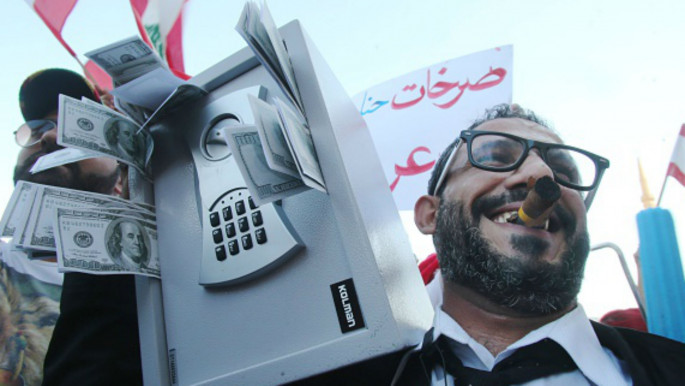Corruption Index: Qatar is the 'cleanest' Arab state
However, conflict-ridden Arab states including Syria, Yemen and Somalia have seen their rankings remain critically low.
Published each year for more than two decades by the Berlin-based organisation, the CPI aims to measure "perceived levels of public sector corruption worldwide".
The index ranks countries on a scale from 100 [very clean] to 0 [highly corrupt] with low points reflecting the misuse of public power, prevalence of bribery, lack of transparency and accountability, as well as government officials going unpunished for corruption.
Higher scores are given to countries based on transparent public spending, the provision of government budget information and the independence of the judiciary.
The report identifies a number of Arab states who have made progress in fighting corruption including Qatar, UAE, Jordan and Saudi Arabia.
But Arab states embroiled in armed conflict such as Syria, Yemen and Sudan have seen significant falls.
 |
Arab states embroiled in armed conflict such as Syria, Yemen and Sudan have seen significant falls |  |
The CPI has increasingly become a highly regarded and influential survey of good governance and a key marker in international efforts to fight corruption.
Consequences of corrupt practice can include child exploitation and high mortality rates, poor education standards, environmental destruction - and terrorism.
Once again, Scandinavian nations retained the top positions in the index, with Denmark coming first, followed by Finland and Sweden.
Other countries in the top 10 included [in order] New Zealand, The Netherlands, Norway, Switzerland, Singapore, Canada and Germany.
"The scale of the issue is huge," the report said, "Sixty-eight percent of countries worldwide have a serious corruption problem. Half of the G20 are among them."
While countries such as Greece, Senegal and the UK saw a "significant increase in scores since 2012" others saw their rankings plunge, including Brazil, Spain and Turkey.
Half of all OECD [Organisation for Economic Co-Operation and Development] countries, whose membership includes France, Germany, UK and the US, have violated international obligations to "crack down on bribery by their companies abroad".
"Just because a country has a clean public sector at home [it] doesn't mean it isn't linked to corruption elsewhere," the report added.
Meanwhile, some GCC members improved their rankings, with Qatar leading the region from the 22 spot, going up from position 26 in 2014.
 |
Some GCC members improved their rankings, with Qatar leading the region from the 22 spot, going up from position 26 in 2014 |  |
The United Arab Emirates followed closely, ranking 23, up two spots from the previous year.
Bahrain came in ranked number 50, moving up from 55 in 2014.
Oman also moved up five spots from the previous year's report, ranking at 60 this year.
Notable in the most recent report is that levels of corruption were highest in countries plagued by war or political instability. "Five of the ten most corrupt countries also rank among the ten least peaceful places in the world," it stated.
 |
|
|
Protests against corruption in the Middle East have long been popular [Getty] |
For the people of the Arab world, it will come as little surprise that countries ranked lowest in the index are those plagued by conflict and civil war.
How reliable is the index?
Criticism has often followed the think-tank's publication of the index, particularly regarding its use of "perception" as a main criteria for ranking.
"The CPI scores and ranks countries based on how corrupt a country's public sector is perceived to be," Transparency International states. This score is drawn from a collection of 12 surveys to rank nations around the globe.
Critics have said that the report relied on the "perception" of leading business executives and country-experts.
 |
Critics have said that the report relied on the 'perception' of leading business executives and country-experts |  |
These have been condemned as giving a distorted view based on an "internationally focused elite, typically from a corporate background".
Also, relying on "perception" as a criteria can lead to the index becoming self-perpetuating, critics argue.
With the report turning increasingly influential as years go by, countries deemed "corrupt" become popularly deemed as such by business-people whose own opinion feeds into the index's next publication.
However, Transparency International says its criteria is the best in absence of an alternative system.
 |
Transparency International says its criteria is the best in absence of an alternative system |  |
"There is no meaningful way to assess absolute levels of corruption in countries or territories on the basis of hard empirical data," an accompanying statement to the report said.
"Capturing perceptions of corruption of those in a position to offer assessments of public sector corruption is the most reliable method of comparing relative corruption levels across countries," it added.
Rankings of Arab countries
| Global ranking | 2015 score | 2012 score |
| 22: Qatar | 71 | 68 |
| 23: UAE | 70 | 68 |
| 45: Jordan | 53 | 48 |
| 50: Bahrain | 51 | 51 |
| 55: Kuwait | 49 | 44 |
| 60: Oman | 45 | 47 |
| 76: Tunisia | 41 | 38 |
| =88: Algeria | 36 | 34 |
| =88: Egypt | 36 | 32 |
| =88: Morocco | 36 | 32 |
| 112: Mauritania | 31 | 31 |
| 123: Lebanon | 28 | 30 |
| 136: Comoros | 26 | 28 |
| =154: Syria | 18 | 26 |
| =154: Yemen | 18 | 23 |
| =161: Iraq | 16 | 18 |
| =161: Libya | 16 | 21 |
| 165: Sudan | 12 | 13 |
| 167: Somalia | 8 | 8 |





 Follow the Middle East's top stories in English at The New Arab on Google News
Follow the Middle East's top stories in English at The New Arab on Google News


